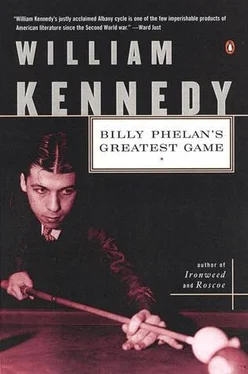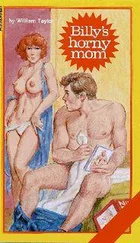“You better do it soon. You ain’t gonna live forever, the way you look.”
“I’ll do it one of these days. I promise you that.”
“Why should I believe your promises?”
“No reason you should, I guess.”
Francis shoved the empty wine glass away and pushed himself sideways out of the booth.
“I gotta get outa here. Tell her I don’t want the soup. I gotta get me down to George’s and get the rest of my money.”
“You’re goin’?” Billy said. “You’re leavin’?”
“Gotta keep movin’. My bones don’t know nothin’ about sittin’ still.”
“You’ll get in touch with Gorman yourself, then?” Martin said.
“I’ll do that,” Francis said. “Righty so.”
“That bail money,” Billy said. “Don’t worry about it. You wanna skip, just skip and forget it. It don’t mean anything to me.”
“I ain’t figurin’ to skip,” Francis said. “But okay, thanks.”
“It doesn’t make any sense to skip,” Martin said. “You won’t do any time with Gorman taking your case. Nobody wants to go to court with him. He turns them all into clowns.”
“I’ll remember that,” Francis said. “Now I gotta move. You understand, Martin.”
“I was gonna buy you some new clothes,” Billy said.
“Hell, they’d just get dirtied up, the way I bounce around. These clothes ain’t so bad.”
When he got no response to that, he took a step toward the door and stopped. “You tell the folks I said hello and that I’m glad they’re feelin’ good.”
“I’ll pass the word,” Billy said.
“Wish you’d let me pay for the drinks. I got the cash.” He was halfway into another step and didn’t know where to put his hands. He held them in front of his stomach.
Billy just stared at him. Martin spoke up.
“No need for that, Fran. Billy said it was his treat.”
“Well, I enjoyed it,” Francis said. “Be seein’ ya around.”
“Around,” Billy said.
Billy and Martin sipped their drinks and said nothing.
“He thinks it’s all right to fink,” Billy said finally, staring at the empty seat.
“I heard what he said.”
“He’s nothin’ like I thought he’d be.”
“Who could be, Billy?”
“How could he tell me to rat on a friend?”
“He doesn’t understand your situation. He knows better. When he got in trouble in the trolley strike. . you know about that?”
“He killed a guy.”
“Not too many knew, and it never got in the papers who did it. Three of us helped him look for round stones that morning. Patsy McCall, your Uncle Chick, and myself. We were twelve, fourteen, like that, and your father was seven or eight years older and on strike. But we hated the scabs as much as he did and we all had stones of our own. Any one of us might have done what he did, but your father had that ballplayer’s arm. He had the fastest throw from third to first I ever saw, and I include Heine Groh. We were down on Broadway in front of the Railroad Y, standing at the back of the crowd. People collected there because they thought the strike talks were going on in the Traction Company building across the street.
“Just then the scabs and the soldiers came along with a trolley and tried to drive it straight through that crowd. It was a bad mistake. There were hundreds ready for them, women too. The women were warriors in the street during that strike. Well, the crowd trapped the trolley between two fires and it couldn’t move either way, and that’s when the stones flew. Everybody was throwing them, and then Francis threw his. It flew out of his fist like a bullet and caught the scab driver on the head. People turned to see who threw it, but your father was already on the run down Broadway and around the corner of Columbia toward the tracks. The soldiers fired on the crowd, and I saw two men hit. We ran then, too, nobody chasing us, and we saw Francis way off and followed him, and when he saw it was us, he waited. We all thought somebody must’ve seen him make the throw, so we started running again and went up to the filtration plant in North Albany, about three miles. Your grandfather, Iron Joe Farrell, was caretaker up there then, and he hid Francis in a room full of sinks and test tubes for two hours.
“We all hung around the place while Iron Joe went back up to Broadway and hitched a ride downtown to find out what was up. He learned from a cop he knew that the soldiers were looking for a young man wearing a cap. The cops didn’t care about catching your father, of course. They were all with the strikers. But the Traction Company bosses forced them into a manhunt, and so we all knew your father couldn’t go back to Colonie Street for a while. Chick went home and packed your father a suitcase and brought it back. Francis said he might head west to play ball somewhere, and if he got a job in a few months, he’d write and tell us.
“He cried then. We all did, over the way he had to go, especially Chick, who worshipped your father. Even Patsy cried a little bit. I remember he wiped his eyes dry with a trainman’s blue handkerchief. And then your father walked across the tracks and hopped a slow freight going north to Troy, which was the wrong direction, but that’s what he did. And Iron Joe said solemnly that none of us should ever say what we knew, and he told us to go home.
“On the way home, Chick said we should take a blood oath not to talk. Patsy and I said that was okay with us but we didn’t know where to get the blood. Patsy wanted to steal a kid from old man Bailey’s herd, but Chick said that was against the Seventh Commandment and he suggested Bid Finnerty’s one-eyed cat, which everybody on Colonie Street hated as a hoodoo anyway. It took us an hour to find the cat, and then Patsy coaxed it with a fish head and brained it with a billy club so it’d lay still. Chick sliced it open and pulled out its heart and made the sign of the cross in blood on the palms of each of our hands. And I made the oath. We swear by the heart of Bid Finnerty’s cat that we won’t say what we know about Francis Phelan as long as we live, and that we won’t wash this sacrificial blood off our hands until it’s time to eat supper.
“The blood was all gone in half an hour, the way we sweated that day As far as I know, none of us ever said anything until your father came back to town by himself months later, when the baseball season was over in Dayton. He called my father from out there to find out whether it was safe for him to come home to Colonie Street. And it was. And he came home and stayed fifteen years.”
“Yeah,” Billy said. “He stayed until he killed somebody else.”
When Martin reached the paper, he found that Patsy McCall had left three messages since noontime. Martin called immediately and Patsy said he didn’t want to go near the newspaper but would pick Martin up by the post office dock on Dean Street in ten minutes. His tone admitted of no other possibility for Martin.
Patsy showed up alone, driving his Packard, and when Martin got in, Patsy gunned the car northward on Quay Street and into Erie Boulevard, a little-traveled dirt road that paralleled the old Erie Canal bed, long since filled in. Patsy said nothing. The road bumped along toward the old filtration plant and led Martin to the vision of Francis running, and to echoes of long-dead voices of old North End canalers and lumber handlers. Immigrants looked out forlornly from the canal boats as they headed west, refused entrance to Albany in the cholera days.
Patsy pulled the car to the side of the road in a desolate spot near the Albany Paper Works. Along the flats in the distance Martin could see the tar-paper shacks hoboes had built. Did Francis have a reservation in one?
Читать дальше












